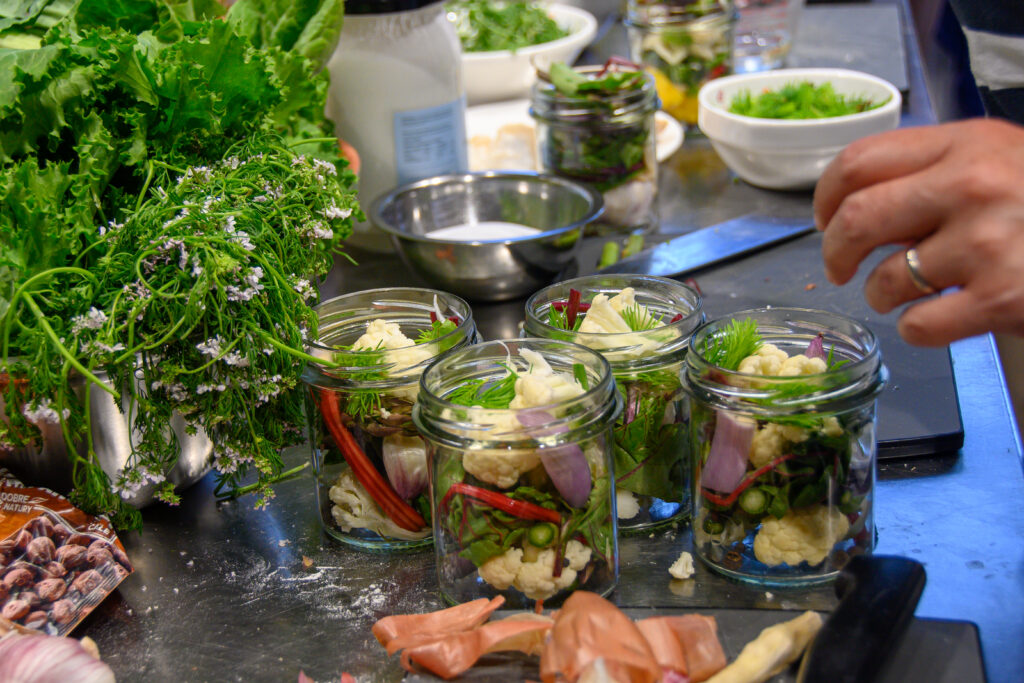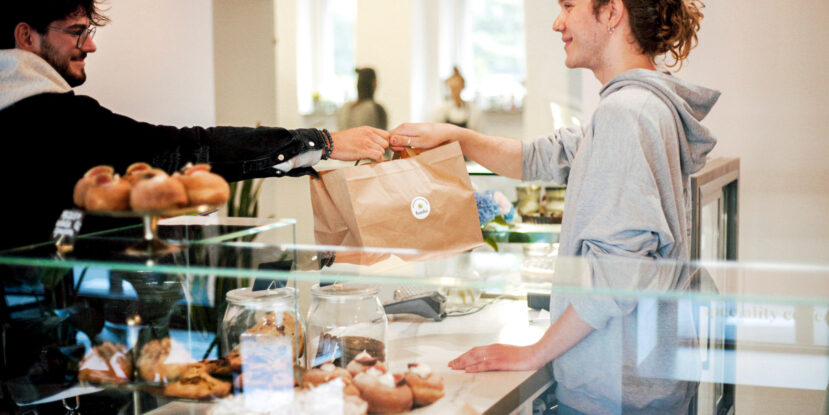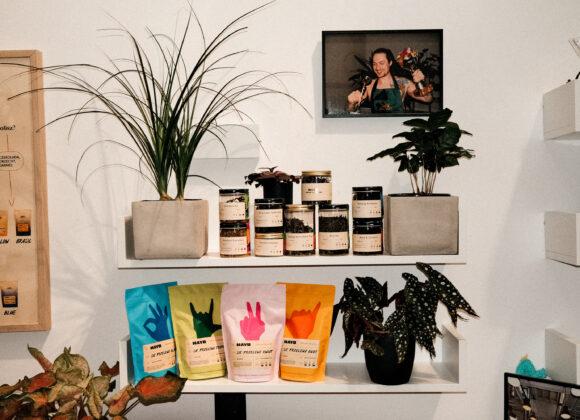Polska ma się coraz gorzej w kwestii marnowania żywności. Jeszcze 8 lat temu ponad połowa respondentów deklarowała, że po świętach w ogóle nie wyrzuca jedzenia. Rok temu było to już jedynie 43%. I choć coraz chętniej do posiłków wykorzystujemy produkty, które zostały nam z poprzedniego dnia, a inflacja skłania do uważniejszego oglądania każdej wydanej złotówki, w porównaniu z 2016 rokiem marnujemy więcej [1]. Wygląda na to, że ani ekologia, ani oszczędność nie są dostateczną motywacją do zmiany nawyków.
Myślimy jedno, robimy drugie
Gdyby przyjrzeć się bliżej deklaracjom Polaków, które dotyczą ich wyborów konsumenckich, okazuje się, że zrównoważony styl życia wcale nie jest nam tak obcy. 62% respondentów deklaruje, że kupuje mniej, by ograniczyć liczbę używanych na co dzień rzeczy. Ponad połowa gotuje tak, żeby nic się nie zmarnowało. Spora część ankietowanych przyznaje, że bodźcem do zmian była pandemia. Coraz więcej Polaków redukuje liczbę posiadanych przedmiotów i skłania się ku prostszemu życiu. Z drugiej strony, jedynie 49% ankietowanych nie kupuje od firm, które wg. ich wiedzy szkodzą środowisku [2]. Pojawia się zatem rozdźwięk między podejmowanymi przez nas działaniami, a tym, co w naszej opinii faktycznie działa na rzecz natury.

źródło: Foodsi
Lekcja z przeszłości
Zaangażowanie konsumentów w jakiekolwiek zbiorowe działanie jest złożonym procesem, który wymaga szczegółowego zrozumienia ich zachowań, trendów społecznych i skutecznych strategii marketingowych. A mając na względzie fakt, że 60% marnowanej żywności wyrzucane jest przez gospodarstwa domowe [3], bez udziału konsumentów, ruch zero waste skazany jest na niepowodzenie. Przyglądając się różnym ruchom społecznym – od tych związanych z prawami obywatelskimi w latach 60., po te dotykające kwestii równości małżeńskiej w XXI wieku – możemy jednak wyróżnić praktyki, które napędzają długoterminowe zmiany kulturowe i instytucjonalne. W Foodsi zwracamy na nie uwagę, staramy się tworzyć autentyczne inicjatywy i inspirować konsumentów do ich propagowania. Taka pomoc w przejściu od intencji do działania jest niezwykle istotna i nieodzowna w procesie zmiany zachowań konsumenckich.
Różne motywacje
Aby konsument miał bodziec do ograniczenia marnowania jedzenia, musi mieć do tego motywację. Dla jednych pozytywny wpływ na środowisko będzie wystarczającym bodźcem do działania, dla innych będą to korzyści finansowe i długoterminowe oszczędności związane z praktykami zero waste. Osoby zorientowane na społeczność będzie z kolei motywowało wspieranie lokalnych przedsiębiorstw. Nieustannie stawiamy się więc w pozycji naszych użytkowników i partnerów, starając się zrozumieć ich bolączki. Dostosowujemy do nich nasz język i uczymy się na błędach. Wiemy np., że przekonywanie partnerów do tego, aby marnowali mniej jedzenia jest z reguły bezskuteczne. Przedsiębiorcy najczęściej reagują na takie słowa z oburzeniem, twierdząc, że u nich w firmie nic się nie marnuje. Zupełnie inaczej odbierają komunikat, że z Foodsi przekują dotychczasowe straty w zysk, czy pozyskają nowych klientów. Językiem korzyści są więc dla nich niejednokrotnie kwestie finansowe, a budowanie ekologicznego wizerunku schodzi na dalszy plan.
Świetlana przyszłość ma odcień zieleni
W Foodsi staramy się pokazać przyszłość, w stworzeniu której, mogą pomóc nasi użytkownicy i partnerzy. Za pomocą serii #ekowtorek przekazujemy w angażujący i przystępny sposób treści na temat ruchu zero waste. Staramy się nie tylko edukować konsumentów na temat wpływu odpadów na środowisko czy korzyści płynących z bardziej zrównoważonego stylu życia. Dzielimy się historiami osób i firm, które z powodzeniem przyjęły praktyki zero waste, tak, aby zainspirować do zaangażowania się w ten ruch. Dobrym przykładem podobnych praktyk jest viralowa animacja Chipotle, która zestawiła przyszłość dystopijną z utopijną, zaznaczając, że ta druga jest możliwa, jeśli podejmiemy stosowne działania w tym kierunku [4]. A żeby konsument chciał się w dany ruch zaangażować, musi widzieć na horyzoncie korzyści związane z bycia jego częścią.
Potrzeba czasu
Droga do horyzontu jest jednak daleka, bo wszelkie ruchy społeczne rosną w czasie. Krótkoterminowe kampanie marketingowe nie są w stanie zapewnić długoterminowego wpływu ani wiarygodności, dlatego w Foodsi bardzo dużo energii wkładamy w budowanie świadomości marki. Kreujemy i utrwalamy w umysłach docelowej grupy konkretny wizerunek i reprezentowane przez nas wartości. Aby skutecznie pracować w górnej części lejka marketingowego, jesteśmy obecni na wielu platformach. Korzystamy z różnych kanałów, aby angażować konsumentów, udostępniać treści czy wspierać dyskusje na tematy związane z ruchem zero waste. Edukacja jest natomiast procesem długotrwałym, nieraz pokoleniowym, więc przyjmujemy długoterminowy sposób myślenia.
Małymi krokami
Podkreślamy, że liczy się każde, nawet najmniejsze działanie. I jak sztampowo by to nie brzmiało, tak właśnie jest. Dostarczamy prostych, praktycznych wskazówek, które konsumenci mogą łatwo wprowadzić w życie. Pokazujemy, co zrobić z ziemniaków, które zostały po wczorajszym obiedzie czy skórek po bananach. Nie silimy się na wymyślne dania czy sposoby, które są zbyt skomplikowane lub czasochłonne. Liczy się prostota. Ta z kolei łączy się w pewien sposób z dostępnością. Staramy się odczarować hasła takie jak “eko” czy “zero waste”, które niejednokrotnie kojarzą się ze sklepowymi alejkami z drogą żywnością bio. Pokazujemy, że zrównoważony styl życia nie jest zarezerwowany dla najzamożniejszych i każdy może włączyć się w ruch, którego celem jest poprawa kondycji naszej planety. Dajemy użytkownikom narzędzie, dzięki któremu nie tylko mogą pomóc w ograniczeniu marnowania jedzenia, ale kupić swoje ulubione produkty nawet 70% taniej.

źródło: Foodsi
Kampanie reklamowe mogą zwiększyć świadomość, ale nie zawsze przyczyniają się do autentycznego budowania społeczności. W idealnym świecie aplikacja taka jak Foodsi byłaby zbędna. Dopóki jednak taki nie nastąpi, robimy, co możemy, żeby stać się ważną częścią globalnego ruchu zero waste.
Źródła:
[1] CBOS. (2023). Deklaracje Polaków dotyczące marnowania żywności. https://www.cbos.pl/SPISKOM.POL/2023/K_126_23.PDF
[2] Intrum. (2021). European Consumer Payment Report 2021. https://mb.cision.com/Main/8612/3463008/1503368.pdf
[3] Wyniki badań IOŚ-PIB, SGGW w ramach projektu PROM, 2020.
[4] https://www.youtube.com/watch?v=DY-GgzZKxUQ [dostęp 24.06.2024r.]
[5] United Nations. 2019. Can we feed the world and ensure no one goes hungry? https://news.un.org/en/story/2019/10/1048452 [dostęp 1.07.2024r.]










 Młodszy specjalista ds. komunikacji marketingowej i PR.
Młodszy specjalista ds. komunikacji marketingowej i PR.


 Absolwent Uniwersytetu Warszawskiego oraz Szkoły Głównej Gospodarstwa Wiejskiego. W branży HoReCa od ponad 10 lat. Przez lata związany z Grupą Trip, Sobienie Królewskie Golf and Country Club oraz restauracją Florentin w Warszawe.
Absolwent Uniwersytetu Warszawskiego oraz Szkoły Głównej Gospodarstwa Wiejskiego. W branży HoReCa od ponad 10 lat. Przez lata związany z Grupą Trip, Sobienie Królewskie Golf and Country Club oraz restauracją Florentin w Warszawe. Absolwentka Wydziału Architektury Politechniki Warszawskiej na kierunku Architecture for Society of Knowledge oraz Komunikacji Wizualnej na Politecnico di Milano. Specjalistka od budowania nastroju. Doświadczenie zdobywała w kraju i zagranicą podczas licznych warsztatów międzynarodowych (Sevilla, Lizbona, Florencja), stypendium na La Sapienza (Rzym) oraz pracując m.in. w Carmi e Ubertis i ADM Milano.
Absolwentka Wydziału Architektury Politechniki Warszawskiej na kierunku Architecture for Society of Knowledge oraz Komunikacji Wizualnej na Politecnico di Milano. Specjalistka od budowania nastroju. Doświadczenie zdobywała w kraju i zagranicą podczas licznych warsztatów międzynarodowych (Sevilla, Lizbona, Florencja), stypendium na La Sapienza (Rzym) oraz pracując m.in. w Carmi e Ubertis i ADM Milano.








 Menedżer z wieloletnim doświadczeniem w branżach kosmetycznej, spożywczej, dziecięcej. W trakcie swojej kariery związany z firmami takimi jak: L’Oreal, Samsung, Danone-Nutricia, Unilever. W ciągu swojego życia zawodowego odpowiadał między innymi za rozwój sprzedaży i contentu eCommerce w Polsce i krajach Europy Środkowo-Wschodniej.
Menedżer z wieloletnim doświadczeniem w branżach kosmetycznej, spożywczej, dziecięcej. W trakcie swojej kariery związany z firmami takimi jak: L’Oreal, Samsung, Danone-Nutricia, Unilever. W ciągu swojego życia zawodowego odpowiadał między innymi za rozwój sprzedaży i contentu eCommerce w Polsce i krajach Europy Środkowo-Wschodniej. 

























































